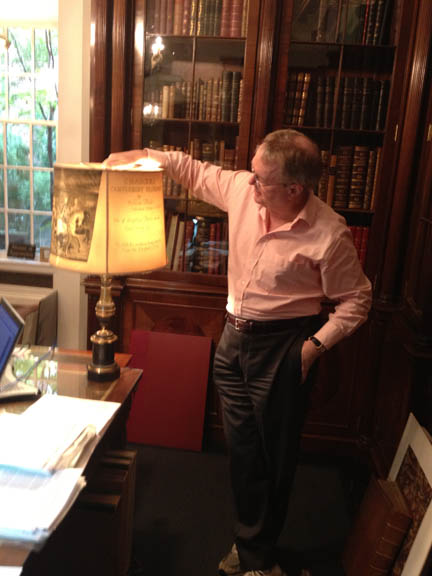Don Heald: A Perspective
- by Bruce E. McKinney

Books and rare things about books
So where to begin?
For starters, there are subjects that will better endure and a few that will prosper, and within these subjects, copies that will increase in value, while others decline. Donald has a strong feeling about these things. But his taste is such that when collecting subjects veer beyond what he owns, he still applies the same standards. The copies he recommends will be the important ones, and he’ll inevitably suggest waiting rather than settling, though it adds years to the wait and sometimes zeros to the price. Significance, he believes, should always matter because it multiplies options at dispersal. It’s important advice, although difficult to accept, because collecting has deep emotional underpinnings that express themselves as urgency to buy. To this Donald rejoins, settling is costly.
This said, collecting printed material does not begin with a Gutenberg; it would more likely complete an exceptional effort pursued over decades. And of course, few collections, although they become great examples, will ever need or contemplate such valuable material. Important collections sent to auction as single owner sales may bring $400,000 to $10,000,000, with a median value (at today’s realizations) of about $1.3 million. Greatness, it turns out, is relative, quality comparative, and this why the greatest collections are often collector-dealer collaborations. The dealer’s years of experience shape and sharpen such collections in ways a collector will appreciate only years later.
Within collecting disciplines, there are all kinds of exceptional efforts. My collection of more than 3,000 printed items relating to the history of the Hudson Valley may be worth a million, a collection of early Shakespeare, perhaps 20 prized items altogether $20 million. With so many books and printed examples to consider, there will always be possibilities.
In my view, then when starting a collection, selecting a dealer as advisor and architect will prove more important than buying any initial books. Setting the keel is that important. When the day eventually comes to disperse, if the collection is coherent, the material appealing, and the examples exceptional, the welcome will be warm. In the process, a few of the determined will build not only a collection; they will build a reputation, or as is said in the trade, a name.
This, then, is something to think about when reaching for an interesting book, and if your desire exceeds your knowledge, think to ask who can explain how this single volume will fit into a pattern of purchases that in time becomes a collection.
From Mr. Heald, here are ten examples of books he believes will look as desirable in future as they are today. They connect to many potential collections. If one of these items intersects with your interests, I recommend speaking to your dealer about it for their perspective. And of course, it goes without saying you can contact Mr. Heald’s office yourself. But be forewarned! The man can charm monkeys down from trees.
Link to 10 items.
So, on a beautiful New York day in August 2012 on the Upper East Side it's apparent Donald Heald is one of the few that in an hour or two can bring a potential collection to life. He is that skilled. For a collector these few hours can define an entire collecting career.
Link to the Donald A. Heald website
Donald A. Heald contact information